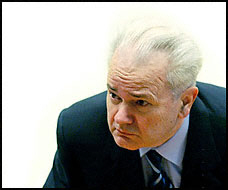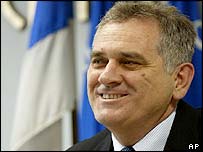After the elections in Serbia
by Start (Sarajevo)

1.
Three days before New Years Eve, Serbia held general elections whose results continue to disturb international opinion. The victory of the ultra-nationalist Serbian Radical Party, led in the absence of Hague detainee Vojislav Šešelj by the still cruder and more radical Tomislav Nikolić, brought the country back from a fragile path of reform to the fascist ambience installed during the rule of Slobodan Milošević. Whatever the outcome of negotiations over the formation of a new government, Serbia has declared itself, sending a message to the rest of the world. One that is ugly and dangerous, but - unfortunately - real.
2.
With his extradition to The Hague, Milošević was eliminated from the game. But not so his political legacy. Serbian society is not ready for changes. The demon of nationalism and the virus of expansionism are still destroying that society. Whatever else may be said of him, the assassinated premier Zoran Đinđić undoubtedly chose the reform path for Serbia. Attentive observers of political developments in that country place Đinđić’s fate in a wider social context: the attempt at reform in Serbia ended in the worst way with the assassination of its premier. We are dealing here with a society essentially not ready for change, or for European integration, or for open and painful confrontation with its sins over the past decade and a half. These elections confirmed this assessment in the most brutal fashion
3.
Reforms are probably doomed to a wait of several years, if not several decades. Serbia is unable to embark on a path capable of restoring the good name it has lost. Its neighbours are disturbed, Europe is worried, while Washington has more important concerns - though it did pronounce a few of the stock phrases usual in such situations. The map of the region, which had previously shown signs of political and civilizational recovery, is back to its pre-war state. Warmongering rhetoric is advancing on the political scene with undiminished intensity.
4.
 Tomislav Nikolić, leader of the Serbian Radical Party and the undoubted electoral victor, has a biography that already presages trouble. He is the kind of person who in 1991 left his job, his wife and his children to go off as a volunteer to Vukovar. We know what happened to that town. It is known too that Vojislav Šešelj rewarded Nikolić for his outstanding war services - whatever that may imply - with promotion to the rank of chetnik vojvoda [war leader]. And the vojvoda behaves accordingly, as if he is just back from the Vukovar campaign. And as if he is preparing a new one. Tomislav Nikolić, leader of the Serbian Radical Party and the undoubted electoral victor, has a biography that already presages trouble. He is the kind of person who in 1991 left his job, his wife and his children to go off as a volunteer to Vukovar. We know what happened to that town. It is known too that Vojislav Šešelj rewarded Nikolić for his outstanding war services - whatever that may imply - with promotion to the rank of chetnik vojvoda [war leader]. And the vojvoda behaves accordingly, as if he is just back from the Vukovar campaign. And as if he is preparing a new one.
5.
This irascible civil engineer has clearly outlined his political intentions: he will oust Svetozar Marović, president of the state union of Serbia and Montenegro, because of his apology to the people of Bosnia-Herzegovina; he will return the Serbian army and police to Kosovo, and he will change borders. On several occasions since the elections Nikolić has declared that he considers Croatia ‘an occupying force on the territory of the Republic of Serb Krajina’. The imaginary line bounding Greater Serbia - Virovitica-Karlovac-Ogulin-Karlobag - for him represents a legitimate political goal. Raw, aggressive and without political polish, Nikolić is the author of a few more such pearls.
6.
His response to a question about whether he regretted the murder in 1999 of journalist Slavko Ćuruvija was particularly indicative: ‘No - and so what?’, he replied. A thoroughly merciless fellow, he is unconcerned at the kind of impression he leaves on others. He has a goal, he has - or at least thinks he has - the means to that goal. He is nearly there…
7.
 The Serbian Radical Party is today Saddam Hussein’s only official sympathizer and collaborator in Europe. Such a political association represents a serious threat to the region. Tomislav Nikolić has already emphasized the fact that Europe does not interest him. His aim is an agreement for stabilization and association with Knin, Banja Luka and Prishtina. Brussels is not on the strategic plan of his party. Whether the democratic bloc manages to reach an agreement and form a minority government, and whether such a government succeeds in opposing the growing power of the Radicals, no one yet dares to predict. Whatever happens, Serbia has entered a high- risk zone from which it will not easily escape. The Serbian Radical Party is today Saddam Hussein’s only official sympathizer and collaborator in Europe. Such a political association represents a serious threat to the region. Tomislav Nikolić has already emphasized the fact that Europe does not interest him. His aim is an agreement for stabilization and association with Knin, Banja Luka and Prishtina. Brussels is not on the strategic plan of his party. Whether the democratic bloc manages to reach an agreement and form a minority government, and whether such a government succeeds in opposing the growing power of the Radicals, no one yet dares to predict. Whatever happens, Serbia has entered a high- risk zone from which it will not easily escape.
8.
Cooperation with The Hague even up to now has not been great. And now everything may be halted for a long time. The European Union seems to be aware of the complexity of the situation, and initially it has been avoiding talking about such cooperation as the crucial condition whereby it will evaluate the work of the new government. And everyone knows that it makes no difference who forms the government, Nikolić or Koštunica. There is no difference, except in marginal nuances…
9.
During the rule of Zoran Đinđić, who should not be idealized but to whom one should give credit for his attempt to reform such a difficult and cocooned society, processes were under way in Serbia intended gradually to lead towards reconciliation, some sort of admission of guilt, and the development of neighbourlyrelations. Both the rhetoric and the practice of Tomislav Nikolić are in total contradiction with that trend. Rather than de-fascization, Serbia according to his recipe is entering upon further radicalization. Are they truly prepared to eat roots? Are they conscious where they are going? Is a U-turn still possible?
10.
Are they ready to accept that catch-phrase of Milošević’s - ‘If we don’t know how to work, then at least we know how to make war ‘- as their own destiny? Serbia has already put one foot into social and economic chaos, which is not just their own problem, since it will destabilize the region en route. Which appears to be the primary goal of the new electoral victors. The most populous and largest post-Yugoslav state holds in its hand the key to stabilizing the Balkans. The military power of Serbia and Montenegro is in ruins, but it is more than enough for a permanent threat and instability that will allow no one in the neighbourhood to sleep peacefully.
This first reaction to the result of the Serbian parliamentary elections of December 2003 has been translated from Start (Sarajevo), 13 January 2004.
|